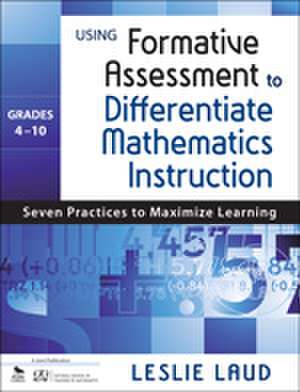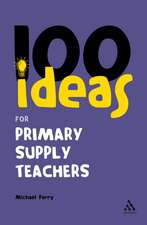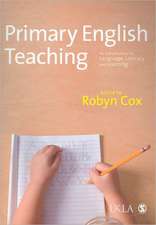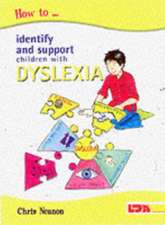Using Formative Assessment to Differentiate Mathematics Instruction, Grades 4–10: Seven Practices to Maximize Learning
Autor Leslie E. Lauden Limba Engleză Paperback – 17 mai 2011
The Leadership and Learning Center
"This book provides a wealth of information for teachers and mathematics leaders to consider when implementing intervention models, RTI programs, and differentiated instruction for low achievers through high achievers."
—Don S. Balka, Professor Emeritus
St. Mary's College, Notre Dame, IN
"Many of the seemingly abstruse or vague concepts—such as differentiated instruction—come alive in the numerous vignettes. Included are many examples of ways to quickly assess relevant student background knowledge before teaching a new topic and how to use this information for tiered instruction following an RTI (Response to Intervention) model."
—From the foreword by Russel Gersten
Director, Instructional Research Group & Professor Emeritus, University of Oregon
Seven easy steps to differentiating math instruction for busy teachers
Are you able to support your struggling students while also challenging your high achievers? Abundant research supports the value of differentiating instruction to students' individual levels, but putting it into practice can be daunting. Staff development expert and former math teacher Leslie Laud provides a clear roadmap for using formative assessment to differentiate mathematics instruction for students in Grades 4–10. She provides a comprehensive framework of seven research-based practices that show how to:
Get started and establish norms
Implement formative assessment
Create tiered lessons
Manage a multitasking classroom effectively
Tested and enhanced by experienced math teachers, the book's strategies are designed for use in conjunction with any curriculum or textbook. Included are a wealth of practical examples, reproducibles, and student activities—all developed with effective time management in mind. Whether you are just starting or interested in enhancing your mathematics instruction, this book will prove an invaluable resource.
Preț: 245.28 lei
Nou
Puncte Express: 368
Preț estimativ în valută:
46.93€ • 49.13$ • 38.83£
46.93€ • 49.13$ • 38.83£
Carte tipărită la comandă
Livrare economică 07-21 aprilie
Preluare comenzi: 021 569.72.76
Specificații
ISBN-13: 9781412995245
ISBN-10: 1412995248
Pagini: 168
Dimensiuni: 216 x 279 x 10 mm
Greutate: 0.47 kg
Ediția:New.
Editura: SAGE Publications
Colecția Corwin
Locul publicării:Thousand Oaks, United States
ISBN-10: 1412995248
Pagini: 168
Dimensiuni: 216 x 279 x 10 mm
Greutate: 0.47 kg
Ediția:New.
Editura: SAGE Publications
Colecția Corwin
Locul publicării:Thousand Oaks, United States
Recenzii
"This practical and thought-provoking book offers time-saving strategies essential for every teacher in every discipline. The numerous self-assessments demonstrate that the best formative assessments are not merely given "to" students but are an interactive learning experience involving students, teachers, and professional colleagues."
"Leslie Laud offers practical support for using formative assessments to inform teachers and students. Her book shimmers with real kids, real classrooms, and real teachers, and includes creative activities that provide both differentiated lessons and opportunities for ALL students to learn."
"This book provides a wealth of information for teachers and mathematics leaders to consider when implementing intervention models, RTI programs, and differentiated instruction for low achievers through high achievers."
"Leslie Laud has created a very readable and comprehensive guide to understanding what formative assessment is and how to use it to meet the needs of students in the mathematics classroom. She offers many specific examples, covering a variety of approaches teachers can use. What is particularly noteworthy is her recognition that different teachers need to come at this work in different ways - that differentiating instruction is not just for students, but for teachers, too."
"Leslie Laud provides practical applications in mathematics assessment and instruction. She uses many vignettes and examples to paint a picture seen in many classrooms today. Throughout the book, Laud includes little gems that help with such areas as motivational strategies to self-determinism to ideas for visual representations. The many teacher tips and sound solutions will support those who are implementing RTI in mathematics.
"Leslie Laud shows the importance of the link between formative assessment and differentiated instruction. There is a limited body of work that combines these two constructs, and that connection makes this book powerful."
"I learned a great deal and plan to make some changes in my 7th grade math classroom. Leslie Laud takes the 'fear' out of trying this method – she uses concrete examples that can be easily implemented by busy teachers. Her book gave me the initiative, reasons, and strategies to experiment with formative assessments to drive tiered instruction in my classroom!"
"I appreciated the ready-to-teach tiered lesson examples and all of the resources that were shared. This book does a nice job of offering helpful web sites and applicable resources to support the classroom teacher."
"Using Formative Assessment to Differentiate Mathematics Instruction provides teachers with a variety of options that they can put in place right away, with little disruption of what they currently do. The author provides many templates for students and teachers to use immediately, and makes a solid argument, based on research, that differentiation is an important component in student achievement."
"The recommendations in this book showed me how to organize my class to support each kind of learner. By providing formative assessment for my students, I am helping them learn what they need to do to help themselves. By providing different kinds of experiences for them to use in the classroom, I am giving them tools to support their own learning. Laud's book focuses on what is doable and reasonable for a classroom teacher."
"The powerful principles described can enhance stduents' learning of mathematics inside and outside the classroom and help teachers modify their lessons and teachings. It is a great way to enrich the teaching and learning of mathematics concepts in middle schools as well as reaching low and high achievers in the classroom."
"Leslie Laud offers practical support for using formative assessments to inform teachers and students. Her book shimmers with real kids, real classrooms, and real teachers, and includes creative activities that provide both differentiated lessons and opportunities for ALL students to learn."
"This book provides a wealth of information for teachers and mathematics leaders to consider when implementing intervention models, RTI programs, and differentiated instruction for low achievers through high achievers."
"Leslie Laud has created a very readable and comprehensive guide to understanding what formative assessment is and how to use it to meet the needs of students in the mathematics classroom. She offers many specific examples, covering a variety of approaches teachers can use. What is particularly noteworthy is her recognition that different teachers need to come at this work in different ways - that differentiating instruction is not just for students, but for teachers, too."
"Leslie Laud provides practical applications in mathematics assessment and instruction. She uses many vignettes and examples to paint a picture seen in many classrooms today. Throughout the book, Laud includes little gems that help with such areas as motivational strategies to self-determinism to ideas for visual representations. The many teacher tips and sound solutions will support those who are implementing RTI in mathematics.
"Leslie Laud shows the importance of the link between formative assessment and differentiated instruction. There is a limited body of work that combines these two constructs, and that connection makes this book powerful."
"I learned a great deal and plan to make some changes in my 7th grade math classroom. Leslie Laud takes the 'fear' out of trying this method – she uses concrete examples that can be easily implemented by busy teachers. Her book gave me the initiative, reasons, and strategies to experiment with formative assessments to drive tiered instruction in my classroom!"
"I appreciated the ready-to-teach tiered lesson examples and all of the resources that were shared. This book does a nice job of offering helpful web sites and applicable resources to support the classroom teacher."
"Using Formative Assessment to Differentiate Mathematics Instruction provides teachers with a variety of options that they can put in place right away, with little disruption of what they currently do. The author provides many templates for students and teachers to use immediately, and makes a solid argument, based on research, that differentiation is an important component in student achievement."
"The recommendations in this book showed me how to organize my class to support each kind of learner. By providing formative assessment for my students, I am helping them learn what they need to do to help themselves. By providing different kinds of experiences for them to use in the classroom, I am giving them tools to support their own learning. Laud's book focuses on what is doable and reasonable for a classroom teacher."
"The powerful principles described can enhance stduents' learning of mathematics inside and outside the classroom and help teachers modify their lessons and teachings. It is a great way to enrich the teaching and learning of mathematics concepts in middle schools as well as reaching low and high achievers in the classroom."
Cuprins
List of Figures
Preface
Acknowledgments
About the Author
1. Getting Started and Establishing Norms
Getting Started
Establishing Class Norms
2. Formative Assessment
What is Formative Assessment?
Where Am I? Involving Students in Self-Assessment
Where Am I Going? Conveying Criteria or Learning Targets
How Will I Get There? Providing Feedback
Impact of Assessment on Confidence and Motivation
3. Tiered Instruction
What Is a Tiered Lesson?
Tiering by Student Characteristics
Tiering by Instructional Characteristics
Tiering Existing Textbook Lessons
Creating a Tiered Lesson
4. Supporting Students Who Are Low Achieving
Differentiating Instruction in Basic Facts
Differentiating for Conceptual Understanding
Differentiating Procedural Support
5. Challenging Students Who Are High Achieving
Exemptions Based on Prior Knowledge and/or Pace of Learning
Opportunities for Higher-Order Math
Strategies to Avoid
Importance of Challenge
6. Time-Saving Management Strategies
Planning Lessons and Units
Managing Students Working on Different Tasks
Assigning Homework
Grading
Wrap-Up
Suggested Resources
References
Index
Preface
Acknowledgments
About the Author
1. Getting Started and Establishing Norms
Getting Started
Establishing Class Norms
2. Formative Assessment
What is Formative Assessment?
Where Am I? Involving Students in Self-Assessment
Where Am I Going? Conveying Criteria or Learning Targets
How Will I Get There? Providing Feedback
Impact of Assessment on Confidence and Motivation
3. Tiered Instruction
What Is a Tiered Lesson?
Tiering by Student Characteristics
Tiering by Instructional Characteristics
Tiering Existing Textbook Lessons
Creating a Tiered Lesson
4. Supporting Students Who Are Low Achieving
Differentiating Instruction in Basic Facts
Differentiating for Conceptual Understanding
Differentiating Procedural Support
5. Challenging Students Who Are High Achieving
Exemptions Based on Prior Knowledge and/or Pace of Learning
Opportunities for Higher-Order Math
Strategies to Avoid
Importance of Challenge
6. Time-Saving Management Strategies
Planning Lessons and Units
Managing Students Working on Different Tasks
Assigning Homework
Grading
Wrap-Up
Suggested Resources
References
Index
Notă biografică
Leslie Laud has differentiated math instruction in her own classroom and in her co-teaching with her math colleagues, and has been doing so for almost two decades. She teaches an online course on Differentiated Middle School Math Instruction at Bank Street College of Education. Additionally, she has presented at many conferences both nationally and internationally, including The National Council of Teachers of Mathematics annual conference. She has also published many articles in leading journals such as Educational Leadership and Teaching Exceptional Children. She currently leads staff development groups with teachers in school systems in the Boston area. She received both her doctorate in curriculum and instruction and her master¿s in special education from Teachers College, Columbia University.
Descriere
Leslie Laud provides a clear roadmap for using formative assessment to differentiate math instruction. This book cites the latest research and describes the instructional procedures found most effective for teaching mathematics (grades 4-10) through a unique comprehensive framework of seven research-based practices.






